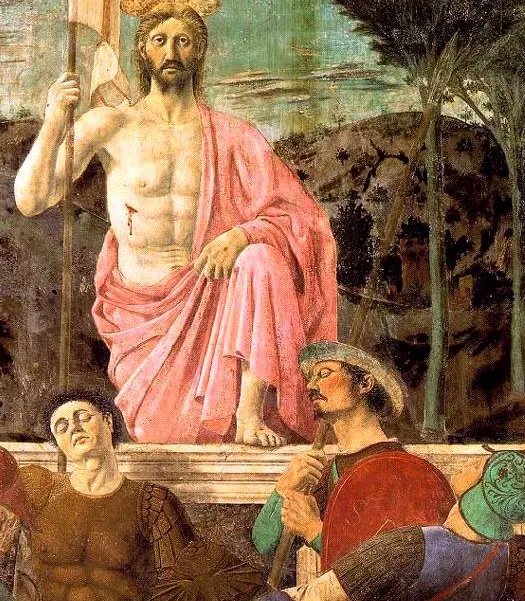Christ Our Passover is Sacrificed For Us: Therefore Let Us Keep the Feast
God be praised, friends; it is the Passover of the Lord!
The Passover of Israel celebrates each year the deliverance of the Hebrews from their slavery in Egypt, and the Passover of the Church celebrates each year the deliverance of all mankind from the slavery of death and the annihilation of the grave which are the wages of sin.
Our English word passover comes through Greek from the Hebrew word pesach, from which we also get our word paschal. This feast of Christ’s Resurrection is called Pascha by most Christians because the Lord Jesus is the Paschal or Passover Lamb whose death is our life, whose flesh is our food, whose blood is our deliverance: for dying, he destroyed our death, and rising, he restored our life.
The means by which the true Lamb of God gives us the gift of everlasting life and a share in his divine glory is the Gospel which is the power of God unto salvation to everyone who believes. And Christ’s Gospel, in turn, comes to us in Word and Sacrament, meaning the inspired Scriptures of the Holy Bible and the seven Sacraments of the New Covenant which are bespoke instruments of grace designed and made for us by the eternal Word who made all things.
Last night in the Paschal Vigil celebrated all over the world, countless men and women were born again by water and the Holy Spirit, anointed with the Sacred Chrism which makes us witnesses to Christ, and then nourished for the first time by the Sacred Body and Precious Blood of Jesus Christ given to us under the appearance of bread and wine in the Most Holy Eucharist.
And now we will renew the promises of our Baptism as a pledge of our dedication to follow the Lord Jesus in the Way of the Cross and live as his missionary disciples to share the Gospel with everyone we meet and invite them to receive the new life of grace by faith, hope, and love in the crucified and Risen Lord.
Friends, death is our most bitter and relentless enemy, and the annihilation of the grave is an offense against the glory of God and the dignity of the human person. But God did not make the grave; we did. By our sins we are all complicit in the rebellion against the Father’s eternal plan for our salvation which began with man’s Fall from grace at the beginning of the human story, and the remedy for that Fall is the medicine of immortality found only in Jesus Christ.
By his Incarnation and holy birth, by his hidden life and public ministry, and above all by his passion, death, and Resurrection, the Lord Jesus restores all creation to the original design of his Father and extends to us an offer of abundant life by the obedience of faith, an offer we are free to accept or reject.
All of this is at the heart of Saint Peter’s proclamation of salvation in Jesus Christ made in the coastal city of Caesarea and found in our first lesson today. Peter was guided to Caesarea by the Lord nine years after his Resurrection to meet a Roman soldier named Cornelius, an honest and honorable pagan who sought to live an upright life by worshiping God as he understood him and by treating all other people with charity and justice, including especially the Jews who lived under Rome’s authority.
Saint Luke describes the Gentile Cornelius as devout and God-fearing and says that he prayed to God constantly. In this way, Cornelius is an example of so many people of our time, a principled pagan who does not yet know the truth of divine revelation but whose life is nonetheless imbued with a deep religious sense, an “awareness (as the Second Vatican Council put it) of a hidden power, which lies behind the course of nature and the events of human life.” (Nostra Aetate, 2)
And the exact nature of that hidden power is what Peter explained to Cornelius and his family and friends at Caesarea: that Jesus of Nazareth is the Christ, the anointed King of all creation. Peter taught them that day in a city named for the Roman Emperor that Jesus was baptized by John, anointed by God the Father with the Holy Spirit and with power. The Lord Jesus then traveled the land healing the sick and proclaiming the Good News of salvation, but the Temple authorities put him to death by hanging him on a tree.
“This man,” Peter continued “God raised up on the third day and granted that he be visible not to all people but to us, the witnesses chosen by God in advance, who ate and drank with him after he rose from the dead. He commissioned us to preach to the people and testify that he is the one appointed by God as judge of the living and the dead. To him all the prophets bear witness, that everyone who believes in him will receive forgiveness of sins through his name.” (Acts 10:39-43)
And so, here we are two thousand years later to celebrate Passover and proclaim with our words and with our lives that Jesus Christ is Lord. He alone is our eternal priest and universal king. Christ is the same yesterday, today and for ever. He is the beginning and the end, the Alpha and the Omega, the one who is, who was, and who is to come. All time belongs to Him and all the ages. To Jesus Christ be glory and power through every age for ever.
Christos Anesti! Alithos Anesti!
Christ is Risen! Truly He is Risen!
Alleluia! Alleluia

